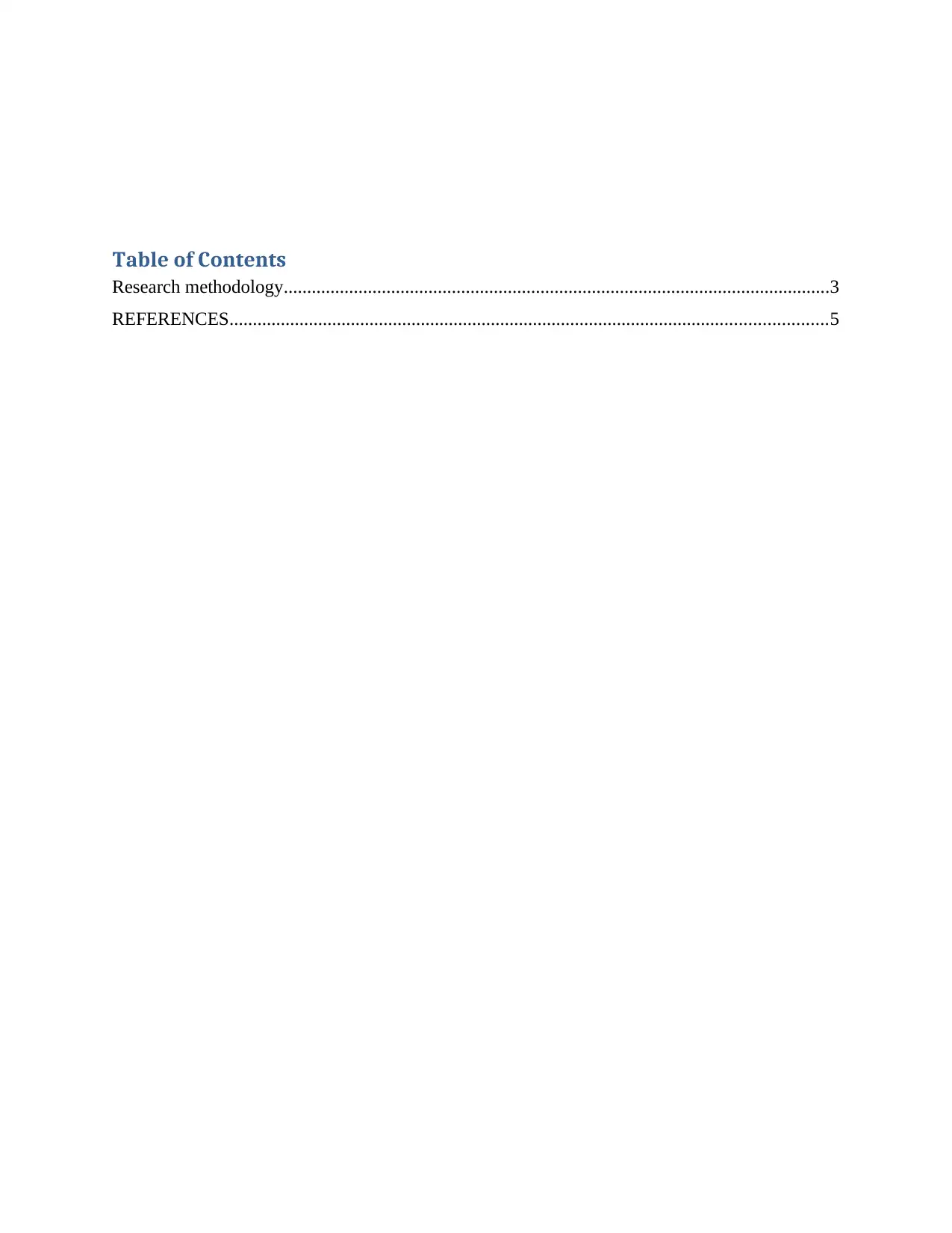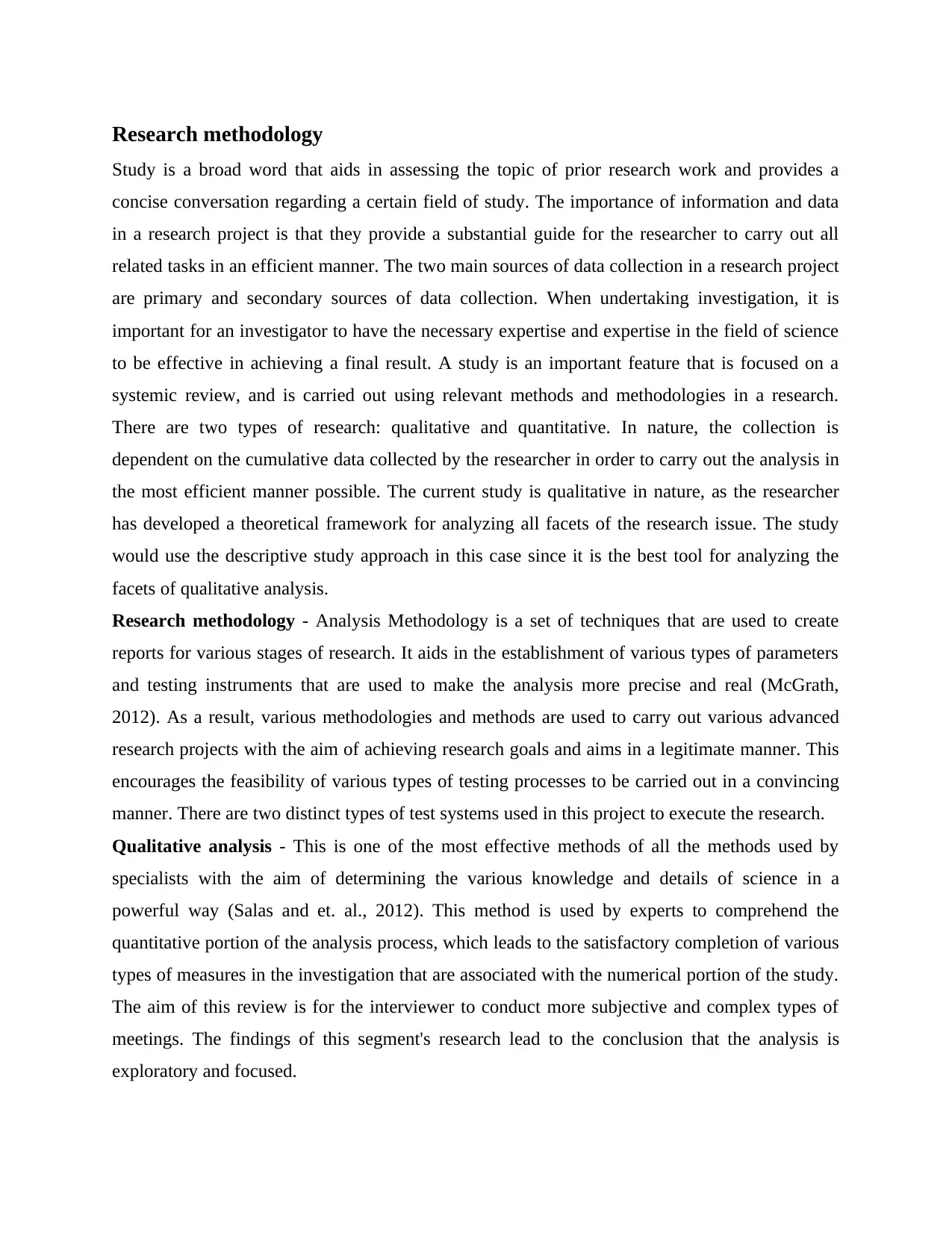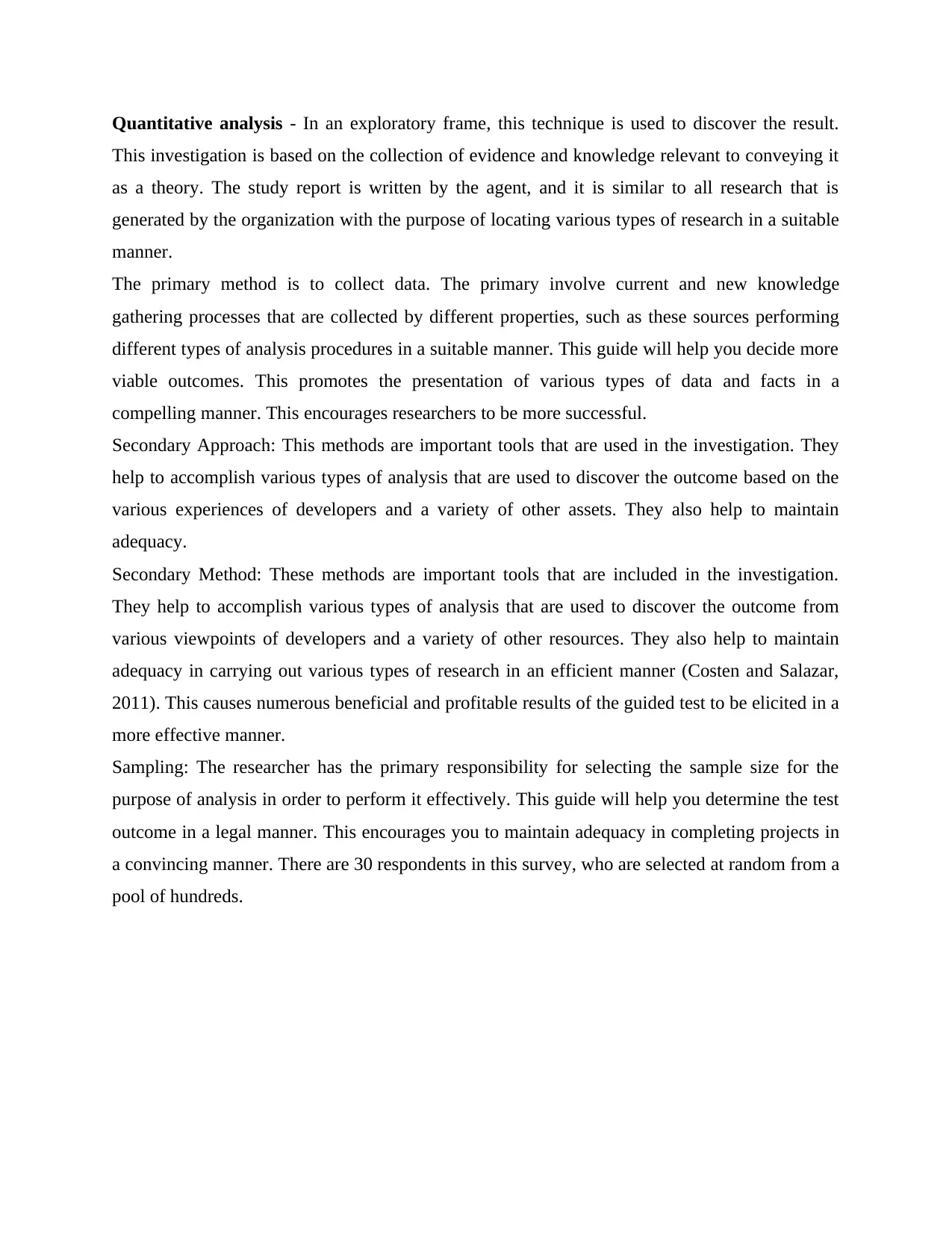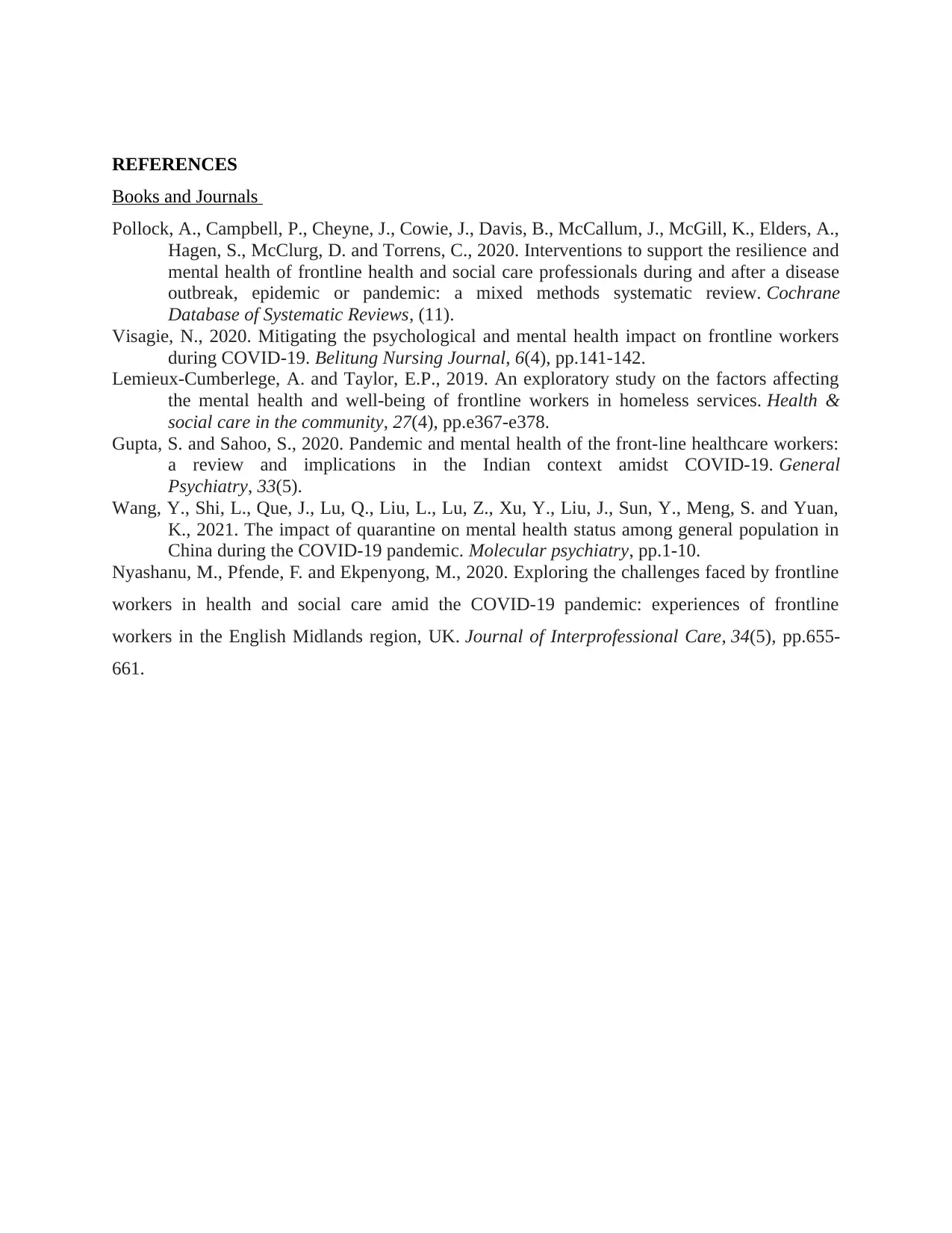Research Methodology Report: Qualitative and Quantitative Analysis
VerifiedAdded on 2022/12/23
|5
|1165
|50
Report
AI Summary
This report provides an overview of research methodology, focusing on both qualitative and quantitative analysis approaches. It explores the significance of data collection, differentiating between primary and secondary sources, and emphasizes the importance of expertise in the field for effective research. The study adopts a descriptive approach, utilizing various methodologies and methods to achieve research goals. The report details qualitative analysis, which aids in understanding the subjective aspects of research, and quantitative analysis, used for exploratory purposes. It also covers data collection techniques, including primary and secondary approaches, and sampling methods. The research includes 30 respondents selected randomly. The references include books and journals that provide background information on the topic. The report highlights the importance of a systemic review and relevant methods to ensure comprehensive and efficient research outcomes.

Research
Paraphrase This Document
Need a fresh take? Get an instant paraphrase of this document with our AI Paraphraser

Table of Contents
Research methodology.....................................................................................................................3
REFERENCES................................................................................................................................5
Research methodology.....................................................................................................................3
REFERENCES................................................................................................................................5

Research methodology
Study is a broad word that aids in assessing the topic of prior research work and provides a
concise conversation regarding a certain field of study. The importance of information and data
in a research project is that they provide a substantial guide for the researcher to carry out all
related tasks in an efficient manner. The two main sources of data collection in a research project
are primary and secondary sources of data collection. When undertaking investigation, it is
important for an investigator to have the necessary expertise and expertise in the field of science
to be effective in achieving a final result. A study is an important feature that is focused on a
systemic review, and is carried out using relevant methods and methodologies in a research.
There are two types of research: qualitative and quantitative. In nature, the collection is
dependent on the cumulative data collected by the researcher in order to carry out the analysis in
the most efficient manner possible. The current study is qualitative in nature, as the researcher
has developed a theoretical framework for analyzing all facets of the research issue. The study
would use the descriptive study approach in this case since it is the best tool for analyzing the
facets of qualitative analysis.
Research methodology - Analysis Methodology is a set of techniques that are used to create
reports for various stages of research. It aids in the establishment of various types of parameters
and testing instruments that are used to make the analysis more precise and real (McGrath,
2012). As a result, various methodologies and methods are used to carry out various advanced
research projects with the aim of achieving research goals and aims in a legitimate manner. This
encourages the feasibility of various types of testing processes to be carried out in a convincing
manner. There are two distinct types of test systems used in this project to execute the research.
Qualitative analysis - This is one of the most effective methods of all the methods used by
specialists with the aim of determining the various knowledge and details of science in a
powerful way (Salas and et. al., 2012). This method is used by experts to comprehend the
quantitative portion of the analysis process, which leads to the satisfactory completion of various
types of measures in the investigation that are associated with the numerical portion of the study.
The aim of this review is for the interviewer to conduct more subjective and complex types of
meetings. The findings of this segment's research lead to the conclusion that the analysis is
exploratory and focused.
Study is a broad word that aids in assessing the topic of prior research work and provides a
concise conversation regarding a certain field of study. The importance of information and data
in a research project is that they provide a substantial guide for the researcher to carry out all
related tasks in an efficient manner. The two main sources of data collection in a research project
are primary and secondary sources of data collection. When undertaking investigation, it is
important for an investigator to have the necessary expertise and expertise in the field of science
to be effective in achieving a final result. A study is an important feature that is focused on a
systemic review, and is carried out using relevant methods and methodologies in a research.
There are two types of research: qualitative and quantitative. In nature, the collection is
dependent on the cumulative data collected by the researcher in order to carry out the analysis in
the most efficient manner possible. The current study is qualitative in nature, as the researcher
has developed a theoretical framework for analyzing all facets of the research issue. The study
would use the descriptive study approach in this case since it is the best tool for analyzing the
facets of qualitative analysis.
Research methodology - Analysis Methodology is a set of techniques that are used to create
reports for various stages of research. It aids in the establishment of various types of parameters
and testing instruments that are used to make the analysis more precise and real (McGrath,
2012). As a result, various methodologies and methods are used to carry out various advanced
research projects with the aim of achieving research goals and aims in a legitimate manner. This
encourages the feasibility of various types of testing processes to be carried out in a convincing
manner. There are two distinct types of test systems used in this project to execute the research.
Qualitative analysis - This is one of the most effective methods of all the methods used by
specialists with the aim of determining the various knowledge and details of science in a
powerful way (Salas and et. al., 2012). This method is used by experts to comprehend the
quantitative portion of the analysis process, which leads to the satisfactory completion of various
types of measures in the investigation that are associated with the numerical portion of the study.
The aim of this review is for the interviewer to conduct more subjective and complex types of
meetings. The findings of this segment's research lead to the conclusion that the analysis is
exploratory and focused.
⊘ This is a preview!⊘
Do you want full access?
Subscribe today to unlock all pages.

Trusted by 1+ million students worldwide

Quantitative analysis - In an exploratory frame, this technique is used to discover the result.
This investigation is based on the collection of evidence and knowledge relevant to conveying it
as a theory. The study report is written by the agent, and it is similar to all research that is
generated by the organization with the purpose of locating various types of research in a suitable
manner.
The primary method is to collect data. The primary involve current and new knowledge
gathering processes that are collected by different properties, such as these sources performing
different types of analysis procedures in a suitable manner. This guide will help you decide more
viable outcomes. This promotes the presentation of various types of data and facts in a
compelling manner. This encourages researchers to be more successful.
Secondary Approach: This methods are important tools that are used in the investigation. They
help to accomplish various types of analysis that are used to discover the outcome based on the
various experiences of developers and a variety of other assets. They also help to maintain
adequacy.
Secondary Method: These methods are important tools that are included in the investigation.
They help to accomplish various types of analysis that are used to discover the outcome from
various viewpoints of developers and a variety of other resources. They also help to maintain
adequacy in carrying out various types of research in an efficient manner (Costen and Salazar,
2011). This causes numerous beneficial and profitable results of the guided test to be elicited in a
more effective manner.
Sampling: The researcher has the primary responsibility for selecting the sample size for the
purpose of analysis in order to perform it effectively. This guide will help you determine the test
outcome in a legal manner. This encourages you to maintain adequacy in completing projects in
a convincing manner. There are 30 respondents in this survey, who are selected at random from a
pool of hundreds.
This investigation is based on the collection of evidence and knowledge relevant to conveying it
as a theory. The study report is written by the agent, and it is similar to all research that is
generated by the organization with the purpose of locating various types of research in a suitable
manner.
The primary method is to collect data. The primary involve current and new knowledge
gathering processes that are collected by different properties, such as these sources performing
different types of analysis procedures in a suitable manner. This guide will help you decide more
viable outcomes. This promotes the presentation of various types of data and facts in a
compelling manner. This encourages researchers to be more successful.
Secondary Approach: This methods are important tools that are used in the investigation. They
help to accomplish various types of analysis that are used to discover the outcome based on the
various experiences of developers and a variety of other assets. They also help to maintain
adequacy.
Secondary Method: These methods are important tools that are included in the investigation.
They help to accomplish various types of analysis that are used to discover the outcome from
various viewpoints of developers and a variety of other resources. They also help to maintain
adequacy in carrying out various types of research in an efficient manner (Costen and Salazar,
2011). This causes numerous beneficial and profitable results of the guided test to be elicited in a
more effective manner.
Sampling: The researcher has the primary responsibility for selecting the sample size for the
purpose of analysis in order to perform it effectively. This guide will help you determine the test
outcome in a legal manner. This encourages you to maintain adequacy in completing projects in
a convincing manner. There are 30 respondents in this survey, who are selected at random from a
pool of hundreds.
Paraphrase This Document
Need a fresh take? Get an instant paraphrase of this document with our AI Paraphraser

REFERENCES
Books and Journals
Pollock, A., Campbell, P., Cheyne, J., Cowie, J., Davis, B., McCallum, J., McGill, K., Elders, A.,
Hagen, S., McClurg, D. and Torrens, C., 2020. Interventions to support the resilience and
mental health of frontline health and social care professionals during and after a disease
outbreak, epidemic or pandemic: a mixed methods systematic review. Cochrane
Database of Systematic Reviews, (11).
Visagie, N., 2020. Mitigating the psychological and mental health impact on frontline workers
during COVID-19. Belitung Nursing Journal, 6(4), pp.141-142.
Lemieux‐Cumberlege, A. and Taylor, E.P., 2019. An exploratory study on the factors affecting
the mental health and well‐being of frontline workers in homeless services. Health &
social care in the community, 27(4), pp.e367-e378.
Gupta, S. and Sahoo, S., 2020. Pandemic and mental health of the front-line healthcare workers:
a review and implications in the Indian context amidst COVID-19. General
Psychiatry, 33(5).
Wang, Y., Shi, L., Que, J., Lu, Q., Liu, L., Lu, Z., Xu, Y., Liu, J., Sun, Y., Meng, S. and Yuan,
K., 2021. The impact of quarantine on mental health status among general population in
China during the COVID-19 pandemic. Molecular psychiatry, pp.1-10.
Nyashanu, M., Pfende, F. and Ekpenyong, M., 2020. Exploring the challenges faced by frontline
workers in health and social care amid the COVID-19 pandemic: experiences of frontline
workers in the English Midlands region, UK. Journal of Interprofessional Care, 34(5), pp.655-
661.
Books and Journals
Pollock, A., Campbell, P., Cheyne, J., Cowie, J., Davis, B., McCallum, J., McGill, K., Elders, A.,
Hagen, S., McClurg, D. and Torrens, C., 2020. Interventions to support the resilience and
mental health of frontline health and social care professionals during and after a disease
outbreak, epidemic or pandemic: a mixed methods systematic review. Cochrane
Database of Systematic Reviews, (11).
Visagie, N., 2020. Mitigating the psychological and mental health impact on frontline workers
during COVID-19. Belitung Nursing Journal, 6(4), pp.141-142.
Lemieux‐Cumberlege, A. and Taylor, E.P., 2019. An exploratory study on the factors affecting
the mental health and well‐being of frontline workers in homeless services. Health &
social care in the community, 27(4), pp.e367-e378.
Gupta, S. and Sahoo, S., 2020. Pandemic and mental health of the front-line healthcare workers:
a review and implications in the Indian context amidst COVID-19. General
Psychiatry, 33(5).
Wang, Y., Shi, L., Que, J., Lu, Q., Liu, L., Lu, Z., Xu, Y., Liu, J., Sun, Y., Meng, S. and Yuan,
K., 2021. The impact of quarantine on mental health status among general population in
China during the COVID-19 pandemic. Molecular psychiatry, pp.1-10.
Nyashanu, M., Pfende, F. and Ekpenyong, M., 2020. Exploring the challenges faced by frontline
workers in health and social care amid the COVID-19 pandemic: experiences of frontline
workers in the English Midlands region, UK. Journal of Interprofessional Care, 34(5), pp.655-
661.
1 out of 5
Related Documents
Your All-in-One AI-Powered Toolkit for Academic Success.
+13062052269
info@desklib.com
Available 24*7 on WhatsApp / Email
![[object Object]](/_next/static/media/star-bottom.7253800d.svg)
Unlock your academic potential
Copyright © 2020–2026 A2Z Services. All Rights Reserved. Developed and managed by ZUCOL.





